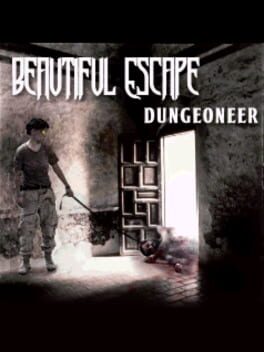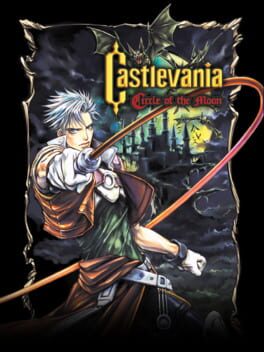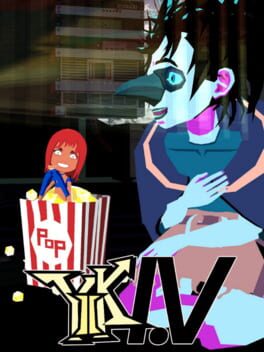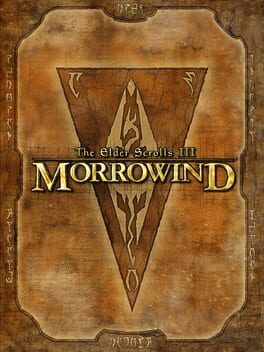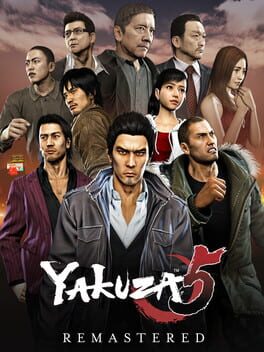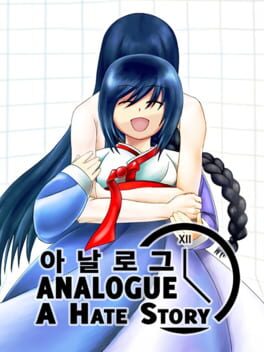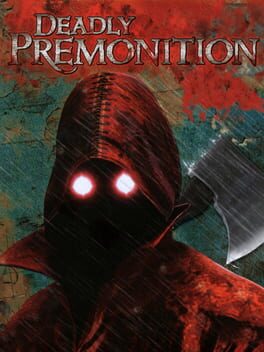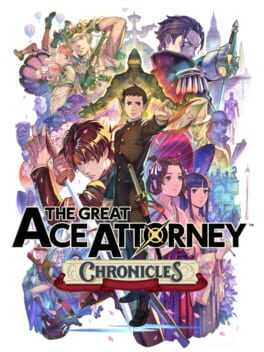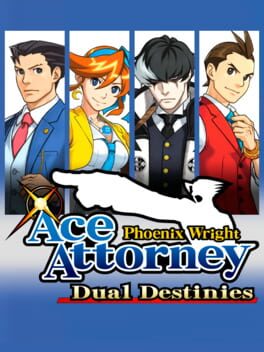conkface
61 reviews liked by conkface
i like how this makes a board full of snuff film fans, with all their philosophizing abt pain and the pleasure in pain, as rly pathetic at their core. mad world plays as verge fails to kidnap women because he has no charisma for them to be interested in him, only ever capturing men w low self-esteem. the dark vampire steampunk vibe renders organized serial killings into a geeky shallow niche--looks rly cool truthfully but also brings out the underlying vanity of their obsession over aesthetics of their murders to be judged under a number rating system (safe :]) and a pithy blurb (not safe :[). love the muse/fan infatuation in how daily plays the game on verge, and how verge comes to play back...outside the cover art n that one tile--which i at least can appreciate how it exists to be suggested more than i do how it may actually be implemented--i think this aged well and is possibly better now than it was back then. suzy has its moments too but isnt as together as this, and therapist mind manager seems rly cool for what little of it i played (the cart life stat management thing is too strong for me) but is maybe too measured by comparison. for all their impulse to rile the player, calunio prods in ways that make them much more interesting than a lot of devs working in rpgmaker, and i do mean many of the "legit" ones too.
YIIK: I.V
TBD
Demo impressions:
Obviously way better than the original. Cool cutscene direction and some occasionally cool shit in here but it's still ultimately YIIK. New battle system is interesting but I could imagine it being more shallow than it looks. Feels like it's trying too hard to be something like Killer7 at points. Overall giving a quizzical eyebrow raise out of ten. I could imagine the full game being good.
Obviously way better than the original. Cool cutscene direction and some occasionally cool shit in here but it's still ultimately YIIK. New battle system is interesting but I could imagine it being more shallow than it looks. Feels like it's trying too hard to be something like Killer7 at points. Overall giving a quizzical eyebrow raise out of ten. I could imagine the full game being good.
There is a tendency when dunking on Bethesda games, to criticize them from the lens of their failure to be like other RPGs- The Witcher 3 is more cinematic and refined, Baldur's Gate 3 more densely written, Fallout 1 more actually good, so on and so forth. The truth is that Bethesda games suck much more tragically and pathetically on their own terms than in comparison to other games, Todd Howard who began his career with monumental works of termite art in the end forsook the dream of the Bethesda game. The dream of the bethesda game was always to create a holodeck, a simulation for you to inhabit totally- 'Why the hell would I pick up a spoon?' someone asks, perfectly reasonably expecting game mechanics to exist for gameplay reasons, but it's just that you can pick up spoons because it's something a person is able to do. Personally I think this dream is perhaps misguided, but nevertheless they pursued it, which is admirable in its own right.
"With this character's death, the thread of prophecy is severed. Restore a saved game to restore the weave of fate, or persist in the doomed world you have created."
The message you receive upon killing a crucial NPC points towards the commitment towards the holodeck dream, it will continue on even if you totally fuck up, and indeed there are generally ways around the death of those crucial NPCs provided you understand the simulation.
And fear of people misunderstanding the simulation is what drove bethesda to make many crucial NPCs invulnerable in Oblivion, you never know when you're actually in a simulation or not anymore, even as the NPC AI had become much more sophisticated with schedules, likes, dislikes and habits, the places you could engage shrunk, and then even the ambitious NPC AI in subsequent games was stripped back for ever more presentable and simpler systems, to the point of Starfield doing deliberately what Morrowind had done out of technical limitations 20 years prior: 24/7 vendor NPCs with no schedules, likes or dislikes, who exist only in service of the player.
But maybe most telling of all, was that in Fallout 4 they decided that the player need a good reason to pick up a spoon.
"With this character's death, the thread of prophecy is severed. Restore a saved game to restore the weave of fate, or persist in the doomed world you have created."
The message you receive upon killing a crucial NPC points towards the commitment towards the holodeck dream, it will continue on even if you totally fuck up, and indeed there are generally ways around the death of those crucial NPCs provided you understand the simulation.
And fear of people misunderstanding the simulation is what drove bethesda to make many crucial NPCs invulnerable in Oblivion, you never know when you're actually in a simulation or not anymore, even as the NPC AI had become much more sophisticated with schedules, likes, dislikes and habits, the places you could engage shrunk, and then even the ambitious NPC AI in subsequent games was stripped back for ever more presentable and simpler systems, to the point of Starfield doing deliberately what Morrowind had done out of technical limitations 20 years prior: 24/7 vendor NPCs with no schedules, likes or dislikes, who exist only in service of the player.
But maybe most telling of all, was that in Fallout 4 they decided that the player need a good reason to pick up a spoon.
Yakuza 5 Remastered
2019
Mizzurna Falls
1998
holy shit, i can't believe i actually played this game. for a bit of context, and i played deadly premonition years ago on PC. i picked it up when i was on sale, iirc i bought it with some CS GO skins i sold lmfao. long story short, i absolutely loved it lol. i was getting into lynch's work at the time, specially twin peaks, so the "small town open world detective" genre really appealed to me. i was kinda disappointed to find that there weren't much games like it though, maybe alan wake or la noire had some of it but none had THE dp feel, except for this one obscure japan-only PS1 game: mizzurna falls, developed by none other than legendary HUMAN entertainment. these guys were responsible for a lot of PS1 horror classics, such as clock tower, or other still untranslated but legendary games like suda51's moonlight syndrome & twilight syndrome.
so yeah, i probably spent years drooling over this game, i almost started japanese classes with the sole purpose of playing this (and maybe SMT: DS, thank god i didn't cus devil summoner sucks lmao), but after a while i forgot about it i guess. then, one fateful day last year i read a news article about this game, and it said that a fan translation has been completed and released!!! holy shit!!!
so it was time to finally download, burn the cd and play it. i have to say, though, that it took me like six months to finally sit down and play it lol. part of that is cuz of work, and university, but mostly i was just afraid that i was gonna be disappointed. i had so much expectation for this game...
and yeah, upon finally starting it, i found all the glaring issues: the controlls are stiff as FUCK, the framerate is all over the place, the graphics are buggy as hell, the music is really annoying and repetitive in the first hour of gameplay or so, the fighting is horrible, the in-game schedule is INCREDIBLY demanding, to the point that multiple events can happen at the same time and crash your playthrough alltoghether. some necesary stuff is completely missable, and there's little hint that it's important. honestly, i recommend playing this game with a guide to make it enjoyable lol.
but all that aside, i loved this game. the town clearly feels more alive than deadly premonition lmao, even for a PS1 game it still has a rather nice open world experience. the story is pretty interesting, it's not a total cheesefest like clock tower. the characters are interesting, the exploration is really fun, and the mystery just works! it's a lot of fun just going around the town meeting new characters and getting into fist fights with random people for no reason. finding clues, following leads, idk i love a good mystery lol.
i honestly can't recomend this game enough if you're like me and love PSX horror and deadly premonition, this game is absolutely for you. hell, anyone who's willing to move past the stiff gameplay is gonna find a really ambitious and different game, even to this day, and it's really something coming from relatively smaller company than other psx developers.
so yeah, that's it lol. mizzurna falls is probably one of my favourite PSX games so far, not because it's a masterpiece, but in part because of all it means to me, and how unique it is (pls game companies make more open world mystery games!! i literally live for this shit). btw massive thanks to the translation team! ngl after all the drama that ensued after project mizzurna and how much dialogue this game has, it's incredible they managed to pull it off. kudos!
so yeah, i probably spent years drooling over this game, i almost started japanese classes with the sole purpose of playing this (and maybe SMT: DS, thank god i didn't cus devil summoner sucks lmao), but after a while i forgot about it i guess. then, one fateful day last year i read a news article about this game, and it said that a fan translation has been completed and released!!! holy shit!!!
so it was time to finally download, burn the cd and play it. i have to say, though, that it took me like six months to finally sit down and play it lol. part of that is cuz of work, and university, but mostly i was just afraid that i was gonna be disappointed. i had so much expectation for this game...
and yeah, upon finally starting it, i found all the glaring issues: the controlls are stiff as FUCK, the framerate is all over the place, the graphics are buggy as hell, the music is really annoying and repetitive in the first hour of gameplay or so, the fighting is horrible, the in-game schedule is INCREDIBLY demanding, to the point that multiple events can happen at the same time and crash your playthrough alltoghether. some necesary stuff is completely missable, and there's little hint that it's important. honestly, i recommend playing this game with a guide to make it enjoyable lol.
but all that aside, i loved this game. the town clearly feels more alive than deadly premonition lmao, even for a PS1 game it still has a rather nice open world experience. the story is pretty interesting, it's not a total cheesefest like clock tower. the characters are interesting, the exploration is really fun, and the mystery just works! it's a lot of fun just going around the town meeting new characters and getting into fist fights with random people for no reason. finding clues, following leads, idk i love a good mystery lol.
i honestly can't recomend this game enough if you're like me and love PSX horror and deadly premonition, this game is absolutely for you. hell, anyone who's willing to move past the stiff gameplay is gonna find a really ambitious and different game, even to this day, and it's really something coming from relatively smaller company than other psx developers.
so yeah, that's it lol. mizzurna falls is probably one of my favourite PSX games so far, not because it's a masterpiece, but in part because of all it means to me, and how unique it is (pls game companies make more open world mystery games!! i literally live for this shit). btw massive thanks to the translation team! ngl after all the drama that ensued after project mizzurna and how much dialogue this game has, it's incredible they managed to pull it off. kudos!
A cruel attempt at political allegory with the sophistication of a MAL review. Borrows a lot of its non-linear structure from Digital: A love Story but loses all of that game's subtlety and specificity in exchange for two anime brides sending you push notifications.
This is predominately a game about patriarchy and the subjugation of women (drawing from Korean history I admittedly do not know much about), and yet at the same time a shotgun love story about doomed AIs literally begging to become your waifu. The easy out would have been to complicate any of these endings as less than happy, but they are played entirely straight. You saved her life, she is your property now.
Analogue makes a lot of big swings at complicated social issues but completely falls apart with even a mild interrogation, as its understanding of sexism is individual affect and an ambiguous, sudden shift from women being free to suddenly not free. The player, of course, is a neutral godlike force who decides if sexism is good or bad. It is at best naive and at worst a cynical reluctance to engage with internalized misogyny (this is most acutely represented by the completely lack of resolution to Mute's rampant misogyny, which gets quietly ignored for the sake of a secret harem ending).
I haven't played Hate+ yet which seems to be slightly more empathetic towards its cast (though also seems to have its own unique problems). There are some interesting interface decisions here that save it from being a complete wash for me, but replaying Digital made even those aspects feel underbaked (seriously, just play Digital, it's a much better game). One of the more bewildering experiences I've had with a game in a long time. Extremely skeptical now of everyone who told me this was good.
---
Content warnings: miscarriages, sexual violence (brief mention), incest (brief mention), body mutilation, underage marriage, confinement, pervasive sexism/misogyny, lesbophobia.
This is predominately a game about patriarchy and the subjugation of women (drawing from Korean history I admittedly do not know much about), and yet at the same time a shotgun love story about doomed AIs literally begging to become your waifu. The easy out would have been to complicate any of these endings as less than happy, but they are played entirely straight. You saved her life, she is your property now.
Analogue makes a lot of big swings at complicated social issues but completely falls apart with even a mild interrogation, as its understanding of sexism is individual affect and an ambiguous, sudden shift from women being free to suddenly not free. The player, of course, is a neutral godlike force who decides if sexism is good or bad. It is at best naive and at worst a cynical reluctance to engage with internalized misogyny (this is most acutely represented by the completely lack of resolution to Mute's rampant misogyny, which gets quietly ignored for the sake of a secret harem ending).
I haven't played Hate+ yet which seems to be slightly more empathetic towards its cast (though also seems to have its own unique problems). There are some interesting interface decisions here that save it from being a complete wash for me, but replaying Digital made even those aspects feel underbaked (seriously, just play Digital, it's a much better game). One of the more bewildering experiences I've had with a game in a long time. Extremely skeptical now of everyone who told me this was good.
---
Content warnings: miscarriages, sexual violence (brief mention), incest (brief mention), body mutilation, underage marriage, confinement, pervasive sexism/misogyny, lesbophobia.
Deadly Premonition
2010
i played this before watching Twin Peaks and holy shit its comical how purely shameless some of it is - for instance, how the second victim was Anna's best friend who's dating a motorcycle enthusiast who gets caught with drugs in his motorbike gas tank. and there's a lot like that here, but the more the game goes on the more it finds its own identity. by the end, it's something completely different and very great. like how in its final stretch the game just decides, fuck it, we got boss fights now. stuff gets insane and it kicks ass and i love it dearly.
A masterful tour de force of a duology. They really are meant to be packaged together, adding and building up on the themes of each other and the franchise as a whole. The games really play on the expectations of the franchise for incredible twists and turns, great characters beats, and compelling narrative angles. Ryunosuke and Susato might be my favorite protagonists of the franchise, with the supporting cast demonstrating fascinating depth and character beneath first impressions.
There's a few flaws, of course. You can really tell that the second game was under stricter budget restrictions and the pacing is often a little odd as a result. There's simply no time to show how a character relationship has drastically changed between cases after a bad first impression. And sometimes its a little unclear if an anti-authority story beat is intentional or accidental.
But even then, I can't find myself docking points. The entire game soars into a delightful package. Capcom put forth a quiz asking people why they were buying GAA and one of the options was "Shu Takumi writing." And rightly so! There's a direction and intent with his games that the modern mainline games lack. You can feel the passion he has for justice and the characters and more. I would love for him to make more Ace Attorney, but I would also love for him to just... make anything! Everything he touches just works. Even when it starts to get silly or a little too soap opera, I accept it because it feels real coming from him somehow. Its a genuine triumph.
There's a few flaws, of course. You can really tell that the second game was under stricter budget restrictions and the pacing is often a little odd as a result. There's simply no time to show how a character relationship has drastically changed between cases after a bad first impression. And sometimes its a little unclear if an anti-authority story beat is intentional or accidental.
But even then, I can't find myself docking points. The entire game soars into a delightful package. Capcom put forth a quiz asking people why they were buying GAA and one of the options was "Shu Takumi writing." And rightly so! There's a direction and intent with his games that the modern mainline games lack. You can feel the passion he has for justice and the characters and more. I would love for him to make more Ace Attorney, but I would also love for him to just... make anything! Everything he touches just works. Even when it starts to get silly or a little too soap opera, I accept it because it feels real coming from him somehow. Its a genuine triumph.
"I am no one. I am nothing but an endless abyss."
- The Phantom, Turnabout for Tomorrow
Dual Destinies is poorly written and creatively bankrupt. I'm honestly impressed by how the game simultaneously derailed the existing continuity and character arcs established in previous games, while also delivering a half baked and childish new storyline that leaves the series nowhere to go in the future.
The “dark age of the law” was a comically awful overarching theme and having villains like Aristotle Means, a guy who genuinely believes lawyers are supposed to lie and forge evidence, is proof of how allergic the writers are from creating actual interesting or thought provoking character drama and moral arguments.
Do we not see the hypocrisy of this story when Phoenix Wright himself used underhanded means (forging evidence, rigging a jury) to justify the end goal of beating Kristoph Gavin and absolving himself in AA4? Like we literally had an interesting “does the end justify the means” moral argument set up for us in the previous game and we throw it all away for this 4Kids ass good vs evil plot line that is resolved by exposing a nameless, faceless villain whose goals were never explained?
Speaking of, the actions of the "phantom" in Dual Destinies was motivated by his desire to cover up his previous crimes from 7 years prior. You might be asking, "what motivated him to commit the crimes of 7 years ago, like disrupting the first rocket launch?" Too bad! There's no explanation! But don't worry, catching him ended the dark age of the law anyways!
There are so many “gags” that just fall back on moments from past games like Trucy only showing up with the panties, turning Apollo’s “I’m fine” into an actual character trait (wtf bro😭), and Phoenix being regressed to a compulsive bluffer. Apollo as a whole is literally a completely different character who shares none of the same motivations and thoughts he did in the previous game. You know how he was consistently at odds with the way Phoenix carried himself and raised Trucy? And how he trusts his clients less? Now, Apollo sees him as a mentor and gets complimented on how similar he is to him. Phoenix also has no reason to exist in this game, he appears to be way less capable, completely undoing the ultimatum he dealt with at the end of Bridge to the Turnabout.
Athena and Blackquill's story is by far the most competent part of this game but it still feels underwhelming given the shared screentime with the other protags, filler cases, and terrible phantom story. Why couldn’t we have had a story about the immorality of Blackquill’s death penalty?
Like the gags, the music is super derivative of past games. So many tracks are uninspired remixes (or straight up ports like guilty love?) although there were a few original bangers like the cross examination themes.
The DLC was mid filler. The fact that they decided to make DLC filler cases at all, in what's supposed to be a narrative-driven mystery series, should tell you how depraved this game truly is.
The mood matrix doubles down on the childish dialogue with conversations like "My sources are telling me you were thinking happy thoughts when you should be thinking sad thoughts." Actual elementary school dialogue, and it pervades through the entire game's writing too, drenched in incredibly cringy anime tropes.
It really feels like the devs wrote themselves into a corner here. They wanted to tell their own story with Athena and Blackquill, but they wanted to bring Phoenix back too. So they had to bring Trucy back. Which meant they also had to bring Apollo back. Oh, and why not give Pearl and Edgeworth a couple seconds of screentime too? Since Athena and Blackquill's story resolved at the end of this game, there is literally no way any of these characters can grow. Dual Destinies toppled the reputation of Ace Attorney in one fell swoop.
Please, by all means, explain to me why having a villain with no name, no face, no backstory, and no clear motivations somehow isn't enough to instantly classify this game as garbage.
- The Phantom, Turnabout for Tomorrow
Dual Destinies is poorly written and creatively bankrupt. I'm honestly impressed by how the game simultaneously derailed the existing continuity and character arcs established in previous games, while also delivering a half baked and childish new storyline that leaves the series nowhere to go in the future.
The “dark age of the law” was a comically awful overarching theme and having villains like Aristotle Means, a guy who genuinely believes lawyers are supposed to lie and forge evidence, is proof of how allergic the writers are from creating actual interesting or thought provoking character drama and moral arguments.
Do we not see the hypocrisy of this story when Phoenix Wright himself used underhanded means (forging evidence, rigging a jury) to justify the end goal of beating Kristoph Gavin and absolving himself in AA4? Like we literally had an interesting “does the end justify the means” moral argument set up for us in the previous game and we throw it all away for this 4Kids ass good vs evil plot line that is resolved by exposing a nameless, faceless villain whose goals were never explained?
Speaking of, the actions of the "phantom" in Dual Destinies was motivated by his desire to cover up his previous crimes from 7 years prior. You might be asking, "what motivated him to commit the crimes of 7 years ago, like disrupting the first rocket launch?" Too bad! There's no explanation! But don't worry, catching him ended the dark age of the law anyways!
There are so many “gags” that just fall back on moments from past games like Trucy only showing up with the panties, turning Apollo’s “I’m fine” into an actual character trait (wtf bro😭), and Phoenix being regressed to a compulsive bluffer. Apollo as a whole is literally a completely different character who shares none of the same motivations and thoughts he did in the previous game. You know how he was consistently at odds with the way Phoenix carried himself and raised Trucy? And how he trusts his clients less? Now, Apollo sees him as a mentor and gets complimented on how similar he is to him. Phoenix also has no reason to exist in this game, he appears to be way less capable, completely undoing the ultimatum he dealt with at the end of Bridge to the Turnabout.
Athena and Blackquill's story is by far the most competent part of this game but it still feels underwhelming given the shared screentime with the other protags, filler cases, and terrible phantom story. Why couldn’t we have had a story about the immorality of Blackquill’s death penalty?
Like the gags, the music is super derivative of past games. So many tracks are uninspired remixes (or straight up ports like guilty love?) although there were a few original bangers like the cross examination themes.
The DLC was mid filler. The fact that they decided to make DLC filler cases at all, in what's supposed to be a narrative-driven mystery series, should tell you how depraved this game truly is.
The mood matrix doubles down on the childish dialogue with conversations like "My sources are telling me you were thinking happy thoughts when you should be thinking sad thoughts." Actual elementary school dialogue, and it pervades through the entire game's writing too, drenched in incredibly cringy anime tropes.
It really feels like the devs wrote themselves into a corner here. They wanted to tell their own story with Athena and Blackquill, but they wanted to bring Phoenix back too. So they had to bring Trucy back. Which meant they also had to bring Apollo back. Oh, and why not give Pearl and Edgeworth a couple seconds of screentime too? Since Athena and Blackquill's story resolved at the end of this game, there is literally no way any of these characters can grow. Dual Destinies toppled the reputation of Ace Attorney in one fell swoop.
Please, by all means, explain to me why having a villain with no name, no face, no backstory, and no clear motivations somehow isn't enough to instantly classify this game as garbage.
